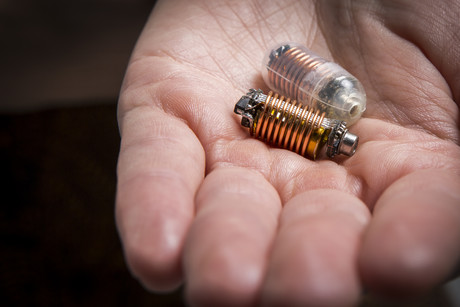Gas-sensing, ingestible capsules pass human trials

Researchers at RMIT University in Melbourne have developed an ingestible capsule that detects and measures gut gases — hydrogen, carbon dioxides and oxygen — in real time.
The first human trials of the gas-sensing, swallowable capsule showed that the human stomach uses an oxidiser to fight foreign bodies in the gut. The technology could revolutionise the way that gut disorders and diseases are prevented and diagnosed.
“We found that the stomach releases oxidising chemicals to break down and beat foreign compounds that are staying in the stomach for longer than usual,” said study lead and capsule co-investor Professor Kourosh Kalantar-zadeh.
“This could represent a gastric protection system against foreign bodies. Such an immune mechanism has never been reported before.”
Another never-before-seen observation from the trial was that the colon may contain oxygen.
“Trials showed the presence of high concentrations of oxygen in the colon under an extremely high-fibre diet,” Kalantar-zadeh said. “This contradicts the old belief that the colon is always oxygen-free.
“This new information could help us better understand how debilitating diseases like colon cancer occur.”
Results showed that the capsule accurately shows the onset of food fermentation, highlighting its potential to clinically monitor digestion and normal gut health.
The trials also demonstrated that the capsule could offer a much more effective way of measuring microbiome activities in the stomach, a critical way of determining gut health.
“Previously, we have had to rely on faecal samples or surgery to sample and analyse microbes in the gut,” Kalantar-zadeh said.
“But this meant measuring them when they are not a true reflection of the gut microbiota at that time. Our capsule will offer a non-invasive method to measure microbiome activity.”
Now that the capsule has successfully passed human trials, the research team is seeking to commercialise the technology.
Co-inventor Dr Kyle Berean said, “The trials show that the capsules are perfectly safe, with no retention.
“Our ingestible sensors offer a potential diagnostic tool for many disorders of the gut from food nutrient malabsorption to colon cancer. It is good news that a less invasive procedure will now be an option for so many people in the future.
“We have partnered with Planet Innovation to establish a company called Atmo Biosciences and bring the product to market.
“This will lead to Phase II human trials and help raise the funds needed to place this safe and revolutionary gut monitoring and diagnostic device into the hands of patients and medical professionals.”
The trials were conducted with colleagues from Monash University. The findings are published in the inaugural volume of Nature Electronics.
Babies of stressed mothers likely to get their teeth earlier
Maternal stress during pregnancy can speed up the timing of teeth eruption, which may be an early...
Customised immune cells used to fight brain cancer
Researchers have developed CAR-T cells — ie, genetically modified immune cells manufactured...
Elevated blood protein levels predict mortality
Proteins that play key roles in the development of diseases such as cancer and inflammation may...





